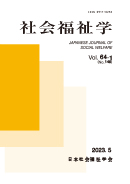Current issue
Displaying 1-15 of 15 articles from this issue
- |<
- <
- 1
- >
- >|
Original Articles
-
2024 Volume 64 Issue 4 Pages 1-13
Published: February 29, 2024
Released on J-STAGE: May 21, 2024
Download PDF (404K) -
2024 Volume 64 Issue 4 Pages 14-29
Published: February 29, 2024
Released on J-STAGE: May 21, 2024
Download PDF (496K) -
2024 Volume 64 Issue 4 Pages 30-41
Published: February 29, 2024
Released on J-STAGE: May 21, 2024
Download PDF (426K) -
2024 Volume 64 Issue 4 Pages 42-55
Published: February 29, 2024
Released on J-STAGE: May 21, 2024
Download PDF (508K)
Research Reports
-
2024 Volume 64 Issue 4 Pages 56-69
Published: February 29, 2024
Released on J-STAGE: May 21, 2024
Download PDF (497K) -
2024 Volume 64 Issue 4 Pages 70-83
Published: February 29, 2024
Released on J-STAGE: May 21, 2024
Download PDF (537K)
Bibliographical Introduction
-
2024 Volume 64 Issue 4 Pages 84-92
Published: February 29, 2024
Released on J-STAGE: May 21, 2024
Download PDF (369K)
Spring Symposium
-
2024 Volume 64 Issue 4 Pages 93-95
Published: February 29, 2024
Released on J-STAGE: May 21, 2024
Download PDF (266K) -
2024 Volume 64 Issue 4 Pages 96-100
Published: February 29, 2024
Released on J-STAGE: May 21, 2024
Download PDF (438K) -
2024 Volume 64 Issue 4 Pages 101
Published: February 29, 2024
Released on J-STAGE: May 21, 2024
Download PDF (377K) -
2024 Volume 64 Issue 4 Pages 106-110
Published: February 29, 2024
Released on J-STAGE: May 21, 2024
Download PDF (366K) -
2024 Volume 64 Issue 4 Pages 111-114
Published: February 29, 2024
Released on J-STAGE: May 21, 2024
Download PDF (310K)
Book Review
-
2024 Volume 64 Issue 4 Pages 115-117
Published: February 29, 2024
Released on J-STAGE: May 21, 2024
Download PDF (206K) -
2024 Volume 64 Issue 4 Pages 118-120
Published: February 29, 2024
Released on J-STAGE: May 21, 2024
Download PDF (216K)
Book Introduction
-
2024 Volume 64 Issue 4 Pages 121
Published: February 29, 2024
Released on J-STAGE: May 21, 2024
Download PDF (155K)
- |<
- <
- 1
- >
- >|
